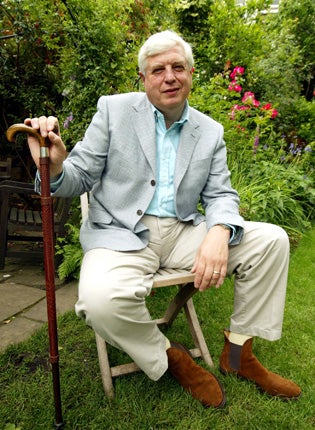BBC is not just ageist against women, says John Simpson
World affairs editor says discrimination comes from top of the Corporation

He once claimed to have liberated Kabul. Now, John Simpson is facing a different kind of war much closer to home: ageism at the BBC. Many female correspondents have railed against age discrimination and now it is the turn of the men. "There are not many of us left," said Simpson, the Corporation's 65-year-old world affairs editor. "We have mostly died out or retired. I'm certainly the oldest person in the BBC newsroom."
He told The Independent that "there should be older people going [to report from] abroad, and there should not be the pressure to give up reporting, after a given age". He added: "I don't see people, certainly reporting, at my sort of age. I don't think there should be rules against it. If they are up to the job [they should do it], but it is a very hard job, in television particularly, lugging lots of recording equipment around, carrying stuff; it's physically hard with long hours." Simpson said he had never been placed under pressure to take retirement and ageism had not affected him directly, but added that he felt there were judgements based around age at the Corporation and "in a big outfit like the BBC, right at the top or fairly near the top, quite a lot of ageism".
He cites one example, an incident in 2009, when he took an idea to BBC1 for a series entitled Top Dogs – a show featuring himself, Sir Ranulph Fiennes and Sir Robin Knox-Johnston, which the channel turned down. "I put forward a proposal with another two elderly characters, but I was told it 'didn't fit the audience profile of BBC1' [which meant] they didn't want old people on BBC1. The proposal was something that BBC2 took up."
Simpson is probably the most experienced BBC correspondent, having reported from more than 120 countries, including 30 war zones, and interviewed many world leaders, but he is acutely aware that he is in the minority among older journalists.
A survey shows that BBC1 has a lower proportion of older talent than its commercial rival ITV. At ITV1, 27 per cent of presenters and actors are aged at least 50 compared with 20 per cent on BBC1. The gap is bigger for men than for women. Twenty-two per cent of BBC1's male actors and presenters are over 50 compared to 29 per cent at ITV1. The figures for women over 50 are 18 per cent at BBC1 and 24 per cent at ITV1, research by Anchor, a residential care provider, has found.
On news and current affairs programmes, the lead is maintained, with 31 per cent of ITV1's presenters being 50 or more compared to 28 per cent at BBC1. But BBC2 had the most age-friendly mix of presenters and actors with 37 per cent being from the 50-plus group, more than any other broadcaster.
There were distinct advantages to nurturing a greyer newsroom, Simpson suggested, with greater experience and a sense of confidence among reporters who were prepared to stand behind the kind of investigative rigour he discusses in his latest book, Unreliable Sources.
"Everything I say is directed towards my own case but one thing you lose [with experience] is your sense of nervousness about saying things that will not be popular.
"If I go somewhere and don't get a story, I just come back and say I don't have a story. You don't feel you have to please people. [It's] a case for older journalists."
Join our commenting forum
Join thought-provoking conversations, follow other Independent readers and see their replies
Comments
Bookmark popover
Removed from bookmarks